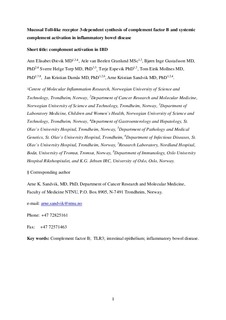| dc.contributor.author | Østvik, Ann Elisabet | |
| dc.contributor.author | Granlund, Atle Van Beelen | |
| dc.contributor.author | Gustafsson, Björn | |
| dc.contributor.author | Torp, Sverre Helge | |
| dc.contributor.author | Espevik, Terje | |
| dc.contributor.author | Mollnes, Tom Eirik | |
| dc.contributor.author | Damås, Jan Kristian | |
| dc.contributor.author | Sandvik, Arne Kristian | |
| dc.date.accessioned | 2017-11-02T13:01:04Z | |
| dc.date.available | 2017-11-02T13:01:04Z | |
| dc.date.created | 2014-08-21T10:18:52Z | |
| dc.date.issued | 2014 | |
| dc.identifier.citation | Inflammatory Bowel Diseases. 2014, 20 (6), 995-1003. | nb_NO |
| dc.identifier.issn | 1078-0998 | |
| dc.identifier.uri | http://hdl.handle.net/11250/2463733 | |
| dc.description.abstract | Background: Recent studies link Toll-like receptor 3 (TLR3) to the pathogenesis of inflammatory bowel disease (IBD). Screening TLR3-agonist response in an intestinal epithelial cell line, we found complement factor B mRNA (CFB) potently upregulated and went on to further study localization of complement factor B synthesis and systemic activation of complement in ulcerative colitis and Crohn's disease. Methods: In a transcriptome analysis of poly (I:C) stimulated HT-29 cells, we found CFB highly upregulated downstream of TLR3. We sought to confirm CFB upregulation in a microarray gene expression analysis on colonic biopsies from an IBD population (n = 133). Immunohistochemical staining and in situ hybridization were done to identify cellular sources of factor B and CFB. Systemic complement activation was assessed in plasma (n = 18) using neoepitope-based enzyme linked immunosorbent assay. Results: CFB mRNA and protein were abundantly expressed in the colonic epithelial cell line, and synthesis enhanced by the poly (I:C) TLR3 ligand. In inflamed versus normal colonic mucosa of ulcerative colitis and Crohn's disease, CFB mRNA was the most significantly overexpressed gene and the mRNA abundance ratio was among the 50 highest. Epithelial cells were the dominating site of factor B expression. Systemic complement activation was significantly higher in active than in nonactive IBD. Conclusions: This study is the first to link TLR3 to activation of the alternative complement pathway. Complement factor B is potently upregulated locally in IBD in addition to having a possible central role in systemic complement activation. This suggests a prominent role for complement in IBD pathogenesis. | nb_NO |
| dc.language.iso | eng | nb_NO |
| dc.publisher | Lippincott, Williams & Wilkins | nb_NO |
| dc.title | Mucosal toll-like receptor 3-dependent synthesis of complement factor B and systemic complement activation in inflammatory bowel disease | nb_NO |
| dc.type | Journal article | nb_NO |
| dc.description.version | submittedVersion | nb_NO |
| dc.source.pagenumber | 995-1003 | nb_NO |
| dc.source.volume | 20 | nb_NO |
| dc.source.journal | Inflammatory Bowel Diseases | nb_NO |
| dc.source.issue | 6 | nb_NO |
| dc.identifier.doi | 10.1097/MIB.0000000000000035 | |
| dc.identifier.cristin | 1148209 | |
| dc.relation.project | Norges forskningsråd: 223255 | nb_NO |
| dc.description.localcode | This is a submitted manuscript of an article published by Lippincott, Williams & Wilkins for Crohn's & Colitis Foundation of America, Inc. in Inflammatory Bowel Diseases, 2014 | nb_NO |
| cristin.unitcode | 194,65,15,0 | |
| cristin.unitname | Institutt for klinisk og molekylær medisin | |
| cristin.ispublished | true | |
| cristin.fulltext | preprint | |
| cristin.qualitycode | 2 | |
